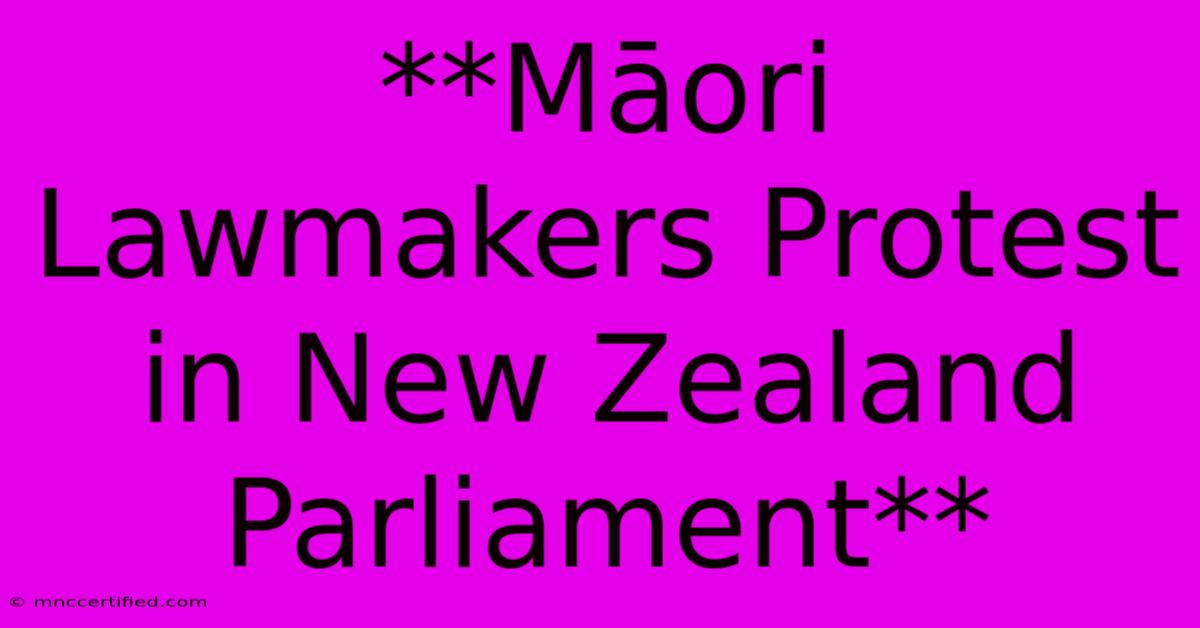**Māori Lawmakers Protest In New Zealand Parliament**

Table of Contents
Māori Lawmakers Stage Protest in New Zealand Parliament: A Fight for Indigenous Rights
On [Date of protest], a powerful scene unfolded in the New Zealand Parliament. Māori lawmakers, members of the Māori Party, staged a protest, demanding recognition of their inherent rights and a greater say in government decisions affecting their communities. This action, captured by cameras and shared across social media, brought the fight for indigenous rights to the forefront of the nation's attention.
What Triggered the Protest?
The protest stemmed from growing frustration over the perceived lack of progress on key issues affecting Māori. These included:
- Treaty of Waitangi breaches: Māori lawmakers are calling for the government to uphold the Treaty of Waitangi, the founding document of New Zealand, which guarantees Māori rights to land, resources, and self-determination. They cite ongoing breaches of the Treaty, citing issues like inadequate consultation on resource management and inadequate redress for historical injustices.
- Inadequate Māori representation: Māori lawmakers are advocating for greater representation in government and decision-making bodies. They argue that Māori voices are underrepresented in areas directly impacting their communities, leading to policies that fail to consider their needs and priorities.
- Social and economic disparities: The protest highlighted persistent social and economic disparities between Māori and non-Māori populations. They point to issues like higher poverty rates, inadequate access to healthcare, and lower educational attainment amongst Māori as evidence of systematic inequalities.
The Protest's Impact
The protest generated significant media attention, bringing the plight of Māori communities to the forefront of national discourse. It also sparked discussions about the government's commitment to addressing historical injustices and ensuring genuine partnership with Māori.
Here's why the protest was significant:
- Public awareness: It raised awareness about the ongoing challenges faced by Māori and the need for systemic change.
- Political pressure: It put pressure on the government to take concrete action on Māori rights and address the grievances raised.
- Māori unity: It demonstrated the strength of Māori solidarity and their collective commitment to advocating for their rights.
Looking Forward
The protest serves as a powerful reminder of the ongoing struggle for Māori rights and recognition in New Zealand. It remains to be seen how the government will respond to the demands raised by the Māori lawmakers. However, the protest has undoubtedly set the stage for a renewed focus on achieving genuine partnership and equitable outcomes for Māori communities.
Keywords: Māori, New Zealand, Parliament, protest, rights, Treaty of Waitangi, indigenous, representation, disparities, government, social, economic, awareness, pressure, unity

Thank you for visiting our website wich cover about **Māori Lawmakers Protest In New Zealand Parliament**. We hope the information provided has been useful to you. Feel free to contact us if you have any questions or need further assistance. See you next time and dont miss to bookmark.
Featured Posts
-
Paraguay Vs Argentina Highlights Wc Qualifiers
Nov 15, 2024
-
Breast Pump Through Insurance Bcbs
Nov 15, 2024
-
How To Stream Venezuela Vs Brazil 2026 World Cup Qualifiers
Nov 15, 2024
-
Rachel Zeglers New Role After Snow White Comments
Nov 15, 2024
-
2026 World Cup Venezuela Vs Brazil
Nov 15, 2024